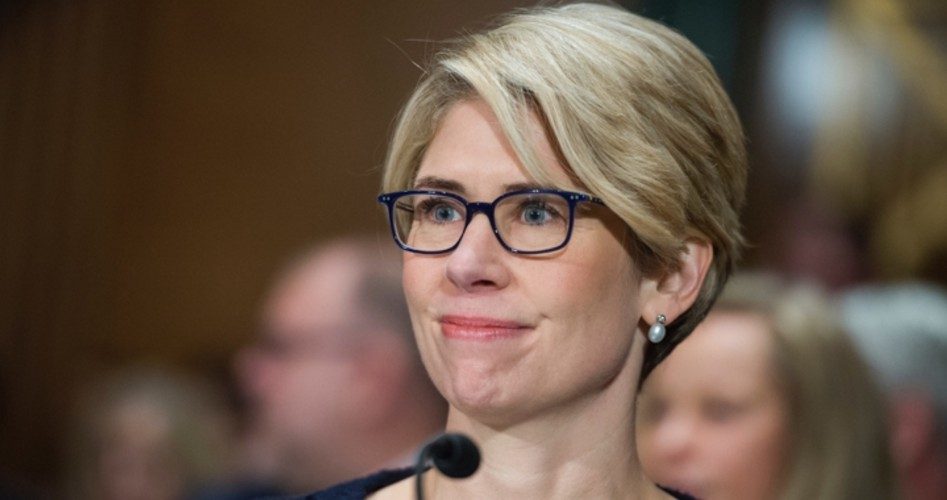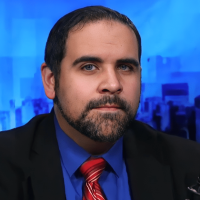
On August 23, the Senate Banking Committee unanimously voted to approve Kimberly Reed (shown) as the president of the Export-Import Bank’s board of directors.
Reed’s approval clears her path toward a confirmation vote on the floor of the Senate, where she is likely to garner wide bipartisan support.
Reed previously was chair of the Republican National Lawyers Association’s board of governors and worked on the Trump-Pence Presidential Transition on the Department of Treasury Landing Team. She was also co-chair of the Trump Agricultural and Rural Advisory Committee.
Despite Reed’s approval by the committee and likely confirmation by the Senate, the Ex-Im Bank’s board of directors still lacks the minimum number of members to make a quorum.
The Ex-Im Bank’s board of directors is composed of five seats. At present, there is only one person serving on the board: acting president Jeffrey Gerrish.
Under current law, the Ex-Im Bank requires a minimum of three board members for a quorum in order to approve medium or long-term transactions exceeding $10 million.
The bank has been without a quorum since 2015, when its charter was last reauthorized.
Going into the vote, Senator Heldi Heitkamp (D-N.D.), a staunch proponent of the bank, contended that a quorum is needed in order to enact reforms to the bank.
“I get that people have ideological challenges and ideological problems with the Ex-Im Bank,” Heitkamp said. “But last time I checked, majority rules — and majority means that we passed overwhelmingly the reauthorization of the Ex-Im Bank with the promise that if you wanted reform, then get us a quorum so we can move the reforms that we put in the Ex-Im charter.”
She continued to voice her frustration over the lack of a quorum. “We don’t even have [a] quorum to vote on the reforms that we embedded into the reauthorization,” Heitkamp said.
According to Senator Heitkamp, the lack of a quorum kills the Ex-Im Bank. “It is clearly designed to kill the Ex-Im Bank by not providing a functioning governing body,” she said.
She followed with a call to approve additional board members to meet the requirements for a quorum.
“If we’re going to engage in trade disruption with our trading partners then maybe one thing that we can do here is help our small businesses, help our large manufacturers and get the Ex-Im Bank up and running,” Heitkamp pleaded. “It’s going to take more than Kimberly Reed.”
Despite Heitkamp’s desperate pleas for a quorum, the Ex-Im Bank has mostly benefitted globalist-run American big business rather than the “small businesses” that she claims it will help.
In the years prior to 2015, the Ex-Im Bank subsidized less than two percent of all U.S. exports. However, more than 61 percent of its financing went to 10 U.S. corporations, including Boeing, Caterpillar, General Electric, Applied Materials Inc., and the Sikorsky Aircraft Corporation.
In fact, the Ex-Im Bank is also known as “Boeing’s Bank” or the “Bank of Boeing,” because Boeing has received upwards of 40 percent of the funds that the bank discharges as loans to foreign countries so they may purchase Boeing’s aircraft.
During the decades that the Ex-Im Bank was in operation, it did little to help lower America’s growing trade deficits with countries such as Mexico and China. Instead, it made it easier for America’s enemies to gain access to American goods at the taxpayers’ expense.
In the past, after the Ex-Im Bank received its funds from the U.S. Treasury (i.e., the American taxpayers), it would give out loans at lower-than-market-value rates with long-term deferred due dates to countries such as the Soviet Union/Russia and Communist China.
If the recipient country failed to pay back its loan, the U.S. taxpayer would foot the bill entirely. As former Congressman Ron Paul (R-Texas) put it in 1980, “The Soviets get the goods. The big banks and companies get the profits. And the taxpayer gets the bill.”
Senator Pat Toomey (R-Penn.), who chairs the Senate Banking Committee and who also voted in favor of Reed, maintains that he will continue to block a quorum on the Ex-Im Bank’s board of directors.
Photo: AP Images




